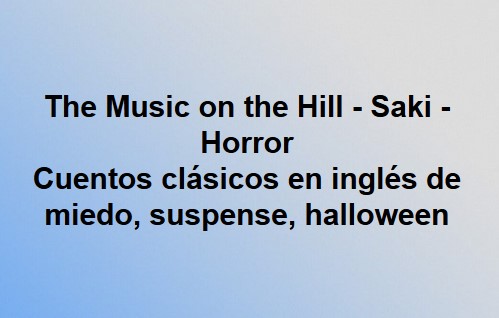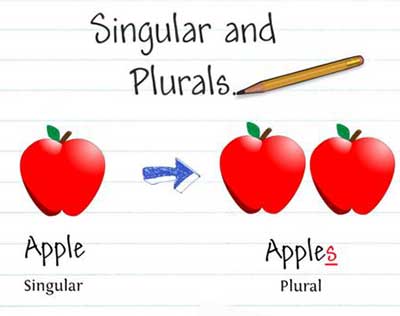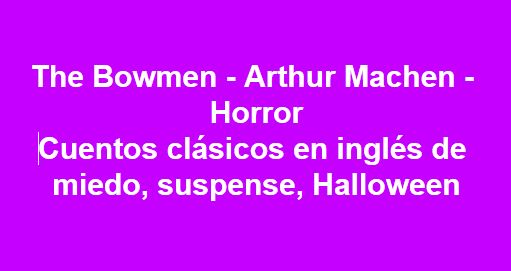
Recursos Educativos en Inglés - Stories in English
Cuentos clásicos en inglés de miedo, suspense, halloween
The Music on the Hill - Saki - Horror
Sylvia Seltoun ate her breakfast in the morning-room at Yessney with a pleasant sense of ultimate victory, such as a fervent Ironside might have permitted himself on the morrow of Worcester fight. She was scarcely pugnacious by temperament, but belonged to that more successful class of fighters who are pugnacious by circumstance. Fate had willed that her life should be occupied with a series of small struggles, usually with the odds slightly against her, and usually she had just managed to come through winning. And now she felt that she had brought her hardest and certainly her most important struggle to a successful issue. To have married Mortimer Seltoun, "Dead Mortimer" as his more intimate enemies called him, in the teeth of the cold hostility of his family, and in spite of his unaffected indifference to women, was indeed an achievement that had needed some determination and adroitness to carry through; yesterday she had brought her victory to its concluding stage by wrenching her husband away from Town and its group of satellite watering-places and "settling him down," in the vocabulary of her kind, in this remote wood-girt manor farm which was his country house.
"You will never get Mortimer to go," his mother had said carpingly, "but if he once goes he'll stay; Yessney throws almost as much a spell over him as Town does. One can understand what holds him to Town, but Yessney--" and the dowager had shrugged her shoulders.
There was a sombre almost savage wildness about Yessney that was certainly not likely to appeal to town-bred tastes, and Sylvia, notwithstanding her name, was accustomed to nothing much more sylvan than "leafy Kensington." She looked on the country as something excellent and wholesome in its way, which was apt to become troublesome if you encouraged it overmuch. Distrust of townlife had been a new thing with her, born of her marriage with Mortimer, and she had watched with satisfaction the gradual fading of what she called "the Jermyn-Street-look" in his eyes as the woods and heather of Yessney had closed in on them yesternight. Her will-power and strategy had prevailed; Mortimer would stay. Outside the morning-room windows was a triangular slope of turf, which the indulgent might call a lawn, and beyond its low hedge of neglected fuschia bushes a steeper slope of heather and bracken dropped down into cavernous combes overgrown with oak and yew. In its wild open savagery there seemed a stealthy linking of the joy of life with the terror of unseen things. Sylvia smiled complacently as she gazed with a School-of-Art appreciation at the landscape, and then of a sudden she almost shuddered.
"It is very wild," she said to Mortimer, who had joined her; "one could almost think that in such a place the worship of Pan had never quite died out."
"The worship of Pan never has died out," said Mortimer. "Other newer gods have drawn aside his votaries from time to time, but he is the Nature-God to whom all must come back at last. He has been called the Father of all the Gods, but most of his children have been stillborn."
Sylvia was religious in an honest, vaguely devotional kind of way, and did not like to hear her beliefs spoken of as mere aftergrowths, but it was at least something new and hopeful to hear Dead Mortimer speak with such energy and conviction on any subject.
"You don't really believe in Pan?" she asked incredulously.
"I've been a fool in most things," said Mortimer quietly, "but I'm not such a fool as not to believe in Pan when I'm down here. And if you're wise you won't disbelieve in him too boastfully while you're in his country."
It was not till a week later, when Sylvia had exhausted the attractions of the woodland walks round Yessney, that she ventured on a tour of inspection of the farm buildings. A farmyard suggested in her mind a scene of cheerful bustle, with churns and flails and smiling dairymaids, and teams of horses drinking knee-deep in duck-crowded ponds. As she wandered among the gaunt grey buildings of Yessney manor farm her first impression was one of crushing stillness and desolation, as though she had happened on some lone deserted homestead long given over to owls and cobwebs; then came a sense of furtive watchful hostility, the same shadow of unseen things that seemed to lurk in the wooded combes and coppices. From behind heavy doors and shuttered windows came the restless stamp of hoof or rasp of chain halter, and at times a muffled bellow from some stalled beast. From a distant comer a shaggy dog watched her with intent unfriendly eyes; as she drew near it slipped quietly into its kennel, and slipped out again as noiselessly when she had passed by. A few hens, questing for food under a rick, stole away under a gate at her approach. Sylvia felt that if she had come across any human beings in this wilderness of barn and byre they would have fled wraith-like from her gaze. At last, turning a corner quickly, she came upon a living thing that did not fly from her. Astretch in a pool of mud was an enormous sow, gigantic beyond the town-woman's wildest computation of swine-flesh, and speedily alert to resent and if necessary repel the unwonted intrusion. It was Sylvia's turn to make an unobtrusive retreat. As she threaded her way past rickyards and cowsheds and long blank walls, she started suddenly at a strange sound - the echo of a boy's laughter, golden and equivocal. Jan, the only boy employed on the farm, a tow-headed, wizen-faced yokel, was visibly at work on a potato clearing half-way up the nearest hill-side, and Mortimer, when questioned, knew of no other probable or possible begetter of the hidden mockery that had ambushed Sylvia's retreat. The memory of that untraceable echo was added to her other impressions of a furtive sinister "something" that hung around Yessney.
Of Mortimer she saw very little; farm and woods and trout- streams seemed to swallow him up from dawn till dusk. Once, following the direction she had seen him take in the morning, she came to an open space in a nut copse, further shut in by huge yew trees, in the centre of which stood a stone pedestal surmounted by a small bronze figure of a youthful Pan. It was a beautiful piece of workmanship, but her attention was chiefly held by the fact that a newly cut bunch of grapes had been placed as an offering at its feet. Grapes were none too plentiful at the manor house, and Sylvia snatched the bunch angrily from the pedestal. Contemptuous annoyance dominated her thoughts as she strolled slowly homeward, and then gave way to a sharp feeling of something that was very near fright; across a thick tangle of undergrowth a boy's face was scowling at her, brown and beautiful, with unutterably evil eyes. It was a lonely pathway, all pathways round Yessney were lonely for the matter of that, and she sped forward without waiting to give a closer scrutiny to this sudden apparition. It was not till she had reached the house that she discovered that she had dropped the bunch of grapes in her flight.
"I saw a youth in the wood today," she told Mortimer that evening, "brown-faced and rather handsome, but a scoundrel to look at. A gipsy lad, I suppose."
"A reasonable theory," said Mortimer, "only there aren't any gipsies in these parts at present."
"Then who was he?" asked Sylvia, and as Mortimer appeared to have no theory of his own she passed on to recount her finding of the votive offering.
"I suppose it was your doing," she observed; "it's a harmless piece of lunacy, but people would think you dreadfully silly if they knew of it."
"Did you meddle with it in any way?" asked Mortimer.
"I - I threw the grapes away. It seemed so silly," said Sylvia, watching Mortimer's impassive face for a sign of annoyance.
"I don't think you were wise to do that," he said reflectively. "I've heard it said that the Wood Gods are rather horrible to those who molest them."
"Horrible perhaps to those that believe in them, but you see I don't," retorted Sylvia.
"All the same," said Mortimer in his even, dispassionate tone, "I should avoid the woods and orchards if I were you, and give a wide berth to the horned beasts on the farm."
It was all nonsense, of course, but in that lonely wood-girt spot nonsense seemed able to rear a bastard brood of uneasiness.
"Mortimer," said Sylvia suddenly, "I think we will go back to Town some time soon."
Her victory had not been so complete as she had supposed; it had carried her on to ground that she was already anxious to quit.
"I don't think you will ever go back to Town," said Mortimer. He seemed to be paraphrasing his mother's prediction as to himself.
Sylvia noted with dissatisfaction and some self-contempt that the course of her next afternoon's ramble took her instinctively clear of the network of woods. As to the horned cattle, Mortimer's warning was scarcely needed, for she had always regarded them as of doubtful neutrality at the best: her imagination
unsexed the most matronly dairy cows and turned them into bulls liable to "see red" at any moment. The ram who fed in the narrow paddock below the orchards she had adjudged, after ample and cautious probation, to be of docile temper; today, however, she decided to leave his docility untested, for the usually tranquil beast was roaming with every sign of restlessness from corner to corner of his meadow. A low, fitful piping, as of some reedy flute, was coming from the depth of a neighbouring copse, and there seemed to be some subtle connection between the animal's restless pacing and the wild music from the wood. Sylvia turned her steps in an upward direction and climbed the heather-clad slopes that stretched in rolling shoulders high above Yessney. She had left the piping notes behind her, but across the wooded combes at her feet the wind brought her another kind of music, the straining bay of hounds in full chase. Yessney was just on the outskirts of the Devon-and-Somerset country, and the hunted deer sometimes came that way. Sylvia could presently see a dark body, breasting hill after hill, and sinking again and again out of sight as he crossed the combes, while behind him steadily swelled that relentless chorus, and she grew tense with the excited sympathy that one feels for any hunted thing in whose capture one is not directly interested. And at last he broke through the outermost line of oak scrub and fern and stood panting in the open, a fat September stag carrying a well-furnished head. His obvious course was to drop down to the brown pools of Undercombe, and thence make his way towards the red deer's favoured sanctuary, the sea. To Sylvia's surprise, however, he turned his head to the upland slope and came lumbering resolutely onward over the heather. "It will be dreadful," she thought, "the hounds will pull him down under my very eyes." But the music of the pack seemed to have died away for a moment, and in its place she heard again that wild piping, which rose now on this side, now on that, as though urging the failing stag to a final effort. Sylvia stood well aside from his path, half hidden in a thick growth of whortle bushes, and watched him swing stiffly upward, his flanks dark with sweat, the coarse hair on his neck showing light by contrast. The pipe music shrilled suddenly around her, seeming to come from the bushes at her very feet, and at the same moment the great beast slewed round and bore directly down upon her. In an instant her pity for the hunted animal was changed to wild terror at her own danger; the thick heather roots mocked her scrambling efforts at flight, and she looked frantically downward for a glimpse of oncoming hounds. The huge antler spikes were within a few yards of her, and in a flash of numbing fear she remembered Mortimer's warning, to beware of horned beasts on the farm. And then with a quick throb of joy she saw that she was not alone; a human figure stood a few paces aside, knee-deep in the whortle bushes.
"Drive it off!" she shrieked. But the figure made no answering movement.
The antlers drove straight at her breast, the acrid smell of the hunted animal was in her nostrils, but her eyes were filled with the horror of something she saw other than her oncoming death. And in her ears rang the echo of a boy's laughter, golden and equivocal.
🔆 Otros cuentos:
Adblock test (Why?)







